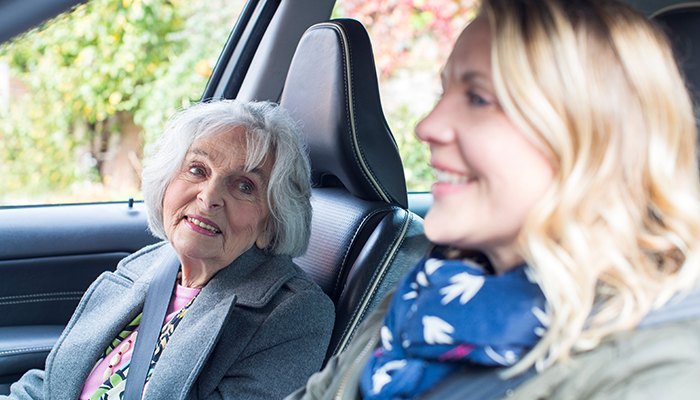Make Every Day Count
Helpful information for family caregivers
November/December 2021
It’s Veteran’s Day! And if the person you care for is a Vietnam vet, they may be dealing with problems stemming directly from their time in the service. You don’t have to handle this alone! The VA (Department of Veterans Affairs) can help. In our middle article we continue our series about services to help at home, particularly for transportation, meals, and daytime relief for you as a family caregiver. Last, we reflect on the coming holidays and strategies to help you get through if you lost a relative this year.
- The special needs of Vietnam-era vets
- Help at home: Community programs
- Holidays without your loved one
The special needs of Vietnam-era vets
 Almost 3.5 million members of the military served in Vietnam between 1964 and 1975. Was your relative one of them? This group of veterans continues to face physical and mental health problems.
Almost 3.5 million members of the military served in Vietnam between 1964 and 1975. Was your relative one of them? This group of veterans continues to face physical and mental health problems.
Agent Orange. This is an herbicide that was widely sprayed during the war. It can cause many illnesses (for instance, some cancers, Parkinson’s disease, diabetes and ALS—Lou Gehrig’s disease). If your loved one has any of these, the Department of Veterans Affairs (VA) can help.
Posttraumatic stress disorder (PTSD). Vietnam veterans experienced not only the trauma of war, but also a conflicted return home. There was no hero’s welcome. No reentry program. This made adjustment to civilian life especially difficult. In fact, 38% of marriages ended within six months of the veteran’s return. Those with PTSD grappled with nightmares, anxiety, panic attacks, and depression. Anger control issues were not uncommon.
Even now, a quarter of a million Vietnam vets are dealing with ongoing emotional issues. To cover painful memories and feelings, many vets have turned to alcohol and drugs. And in the decades since returning, many have also become homeless.
Are you an adult child of a Vietnam vet? Your parent’s challenges likely influenced family life. You may not feel close to your relative as a result. You may also find it hard to balance your vet’s need for eldercare with your own feelings from childhood.
Luckily, the VA has support for both of you
- For Agent Orange–related matters, contact the nearest VA Environmental Health Coordinator.
- The Vet Center (877-WAR-VETS or 877-927-8387) provides help with PTSD issues. PTSD often reemerges in later life. The VA understands.
- The VA Caregiver Support Program (855–260–3274) provides advice on being a vet’s family caregiver.
- The Veterans 24/7 Crisis Line (1-800-273-8255, press 1) is for you or the veteran. (Also www.veteranscrisisline.net/get-help/chat, or text 838255.)
- Find a Veteran Service Officer to help your relative file a disability claim for compensation.
Help at home: Community programs
 For nonmedical support, check out community programs. Many are provided by nonprofit organizations. Others by faith communities. And still others by local government. Most offer discounts or a sliding-scale fee.
For nonmedical support, check out community programs. Many are provided by nonprofit organizations. Others by faith communities. And still others by local government. Most offer discounts or a sliding-scale fee.
Transportation. Check if there are volunteer driver programs sponsored by a senior center or faith community. If bus service is available, there is usually an additional service called “paratransit.” It provides door-to-door transportation. This is ideal for people who can’t walk to a usual bus stop. Find out about local options at ridesinsight.org. Or call 855-607-4337, toll-free.
Adult day programs. An ideal solution for a much-needed daytime break for you. Adult day programs offer engaging activities for older adults who need a lot of help. Also, knowledgeable support for you. Staff are trained to work with memory loss conditions such as Alzheimer’s, Parkinson’s, and stroke. Activities are adapted to the attendees’ abilities. Most programs run about four hours. They provide lunch and social and recreational opportunities. Your loved one is safe and active. You get time for yourself.
Meals. Another social option is “congregate dining.” These are meals—typically lunch—provided in a group setting. There may be one or more centers in the community that host meals. It’s a great opportunity for your relative to have a hot meal and socialize. Cost is minimal and sometimes free. If your loved one is homebound or the pandemic is flaring, meals may be delivered to the house.
Find programs where your loved one lives
- BenefitsCheckup.org provides links to national and local programs. Listings include financial assistance, legal aid, veterans’ benefits, etc.
- The Eldercare Locator is similar. It puts you in touch with your local Area Agency on Aging. You can usually make an appointment to talk with an information specialist. Call 800-677-1116, toll-free.
Holidays without your loved one
 The holiday season is a festive time of year, but it may not feel much like a celebration for people grieving the loss of a loved one. Holidays are an especially tender time for missing those who are no longer with us.
The holiday season is a festive time of year, but it may not feel much like a celebration for people grieving the loss of a loved one. Holidays are an especially tender time for missing those who are no longer with us.
With so many COVID-related deaths in the US, loss has touched many of us. Your family may be one of those struggling with grief this season. You may be asking yourself how to handle the holidays when you are so deeply feeling your loved one’s absence.
Consider these suggestions:
- Be patient with yourself and other family members. Grief does not follow a straight line or calendar. Give yourself permission to take a step back and process how you feel.
- Recognize that you may not feel like yourself. Fuzzy thinking, trouble concentrating, and feelings of loneliness often accompany grief. Other family members may be dealing with these same problems.
- Ease your expectations. Maybe this year, ask for help or keep your holidays simple. Focus on those things that you enjoy and let go of those that are too much work.
- Find meaning in your celebrations. Remember your loved one by sharing memories and happy stories as a family. Include them by setting up a memory table with photos, poems, and keepsakes. Consider a family outing to a place your relative loved. Or do a project you can complete in their name, such as donating to their favorite charity. Perhaps plant a tree in the yard or sponsor a bench in a park.
- Create new holiday traditions. If your usual traditions are too painful, switch up your plans. Change the typical menu. Meet in a different place. Doing something new can give you a fresh perspective and help you stay present.

